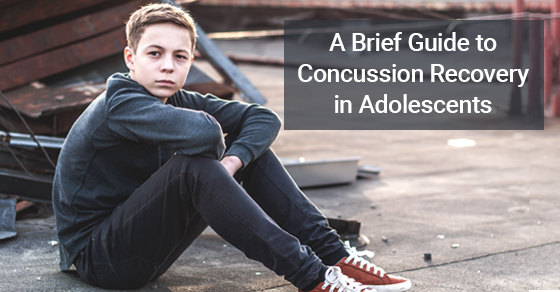What is a Concussion?
A concussion is a brain injury that occurs as a result of trauma or injury to the head. A blow to the head or neck—or even a sudden jolt such as whiplash—can cause your brain to move and bounce around inside your skull. This can damage brain cells and change your brain chemistry. Mild concussions can have minimal symptoms, while severe concussions can cause headaches, dizziness, confusion, brain damage, and even death.
Adolescent Concussion Statistics in Canada
The brain of an adolescent continues to develop well into their early 20s, so a concussion during these years can have a severe impact on the chemistry of their developing brain. This can lead to a wide range of effects and detriments. Children and teenagers often suffer a concussion while playing sports or participating in other recreational activities. It is estimated that 64% of emergency room visits for those aged 10-18 are related to sports or recreational activity injuries, and 39% of those individuals were diagnosed with a concussion. Depending on the severity of the concussion, there can be symptoms as a result of brain damage. The effect of concussions can last for months or even years, making it essential to follow a strict guide for concussion recovery in adolescents to ensure optimal results.
Recovery Time
While children and teenagers may push to return to school as early as possible, it is crucial to have patience with concussion recovery. Depending on the severity of the concussion and the symptoms present, the recovery time will vary. Some adolescents feel good and have no symptoms in as little as 24 hours, some will take months to fully recover, and others will have to live with recurring symptoms for their entire life. The brain is more vulnerable once it has suffered a concussion, and the more concussions you suffer, the more likely they are to cause long-lasting brain damage. As a result, it is crucial that you follow a consistent recovery plan and protect yourself from head and neck injuries in order to prevent a lifetime of symptoms. Here are a few tips for how to handle a concussion:
- Seek medical treatment immediately
When it comes to concussions and any head injury, it is important to contact a medical professional immediately. From concussions to internal bleeding in the brain, you can suffer significant damage without showing any symptoms. Even if you feel fine, a blow to the head should be taken seriously. Do not sleep until after being examined by a doctor.
- After diagnosis and treatment, get lots of rest
Once you have been diagnosed with a concussion by a doctor, you should follow their specific recovery plan. An injured brain needs time and rest to recover fully, so it is important to relax— both physically and mentally—until your doctor says otherwise.
- Don’t rush back to work or school
The physical and mental stress of school or a job can be taxing on your brain. This can delay your recovery and cause even more damage. With concussions and brain injuries, it is important to give yourself the best chance to recover fully before risking another injury, so wait to return to work until your doctor approves.
- Eat healthy and regain strength
Your body and mind are recovering from a traumatic injury, so it is important to keep yourself healthy so you can heal. Be sure to eat a consistent, healthy diet, and avoid any medications or substances that can compromise your brain function, unless they are approved by your doctor. Low-impact exercise can be beneficial if it’s recommended by your doctor. If you find your symptoms getting worse, slow down and accept that you may need more time to recover.
- Be patient
With some brain injuries, the most difficult aspect can be the waiting to get better. Sometimes, it can take a long time for your symptoms to subside and for you to feel like yourself again. Concussions can also change the chemistry of your brain, which can result in anxiety, depression, and other conditions. It is important to contact your doctor and be open about these risks. Most importantly, you have to remain patient and accept that you will recover at your own pace.
- Discuss all medications with your doctor
Some people treat concussion like they would treat a headache: over-the-counter pain medication. Be sure to consult your doctor and let them know about every medication you are taking, as even over-the-counter medications can have unfortunate side-effects when combined with other medication and compromised brain function.
When to Return to Sports
After suffering a sports-related head injury, it is almost impossible to give an accurate timeline of the recovery process. Every concussion is different, and each individual situation should be treated differently. Although teenagers might want to return to school, sports, and other recreational activities as soon as possible, it is up to parents, teachers, and coaches to make sure they do not return until their doctor is confident that they are no longer at risk of further injury.
At Focus Physiotherapy, we offer comprehensive rehabilitation programs for those who have suffered a concussion or other head injury. Our Toronto trauma rehabilitation locations serve patients who have suffered a wide variety of injuries. Our patients are our priority, so we offer personalized treatment to ensure that you get the thorough, precise care you need to recover from your injury. We also offer a variety of other rehabilitation services including:
- Concussion treatment
- Physiotherapy
- Massage therapy
- Acupuncture services
- Custom braces and orthotics
- Laser therapy
- Spinal decompression
- Pre-op and post-op treatment
For more information about our rehabilitation services or to speak with a medical professional about your recovery or rehabilitation needs, contact us here.

